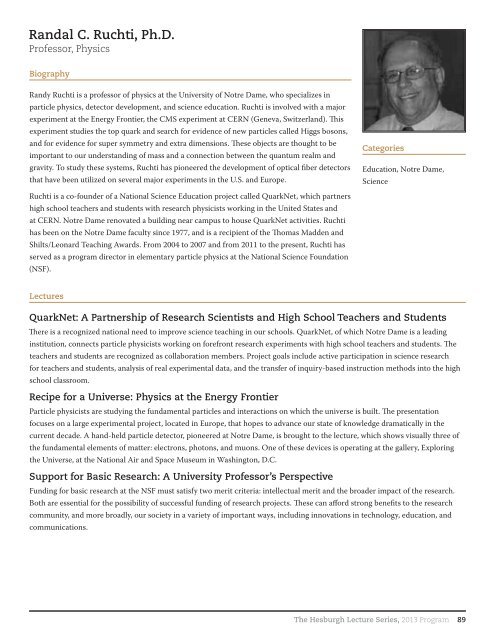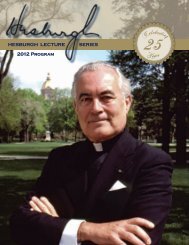HESBURGH LECTURE SERIES 2013 Program - Alumni Association ...
HESBURGH LECTURE SERIES 2013 Program - Alumni Association ...
HESBURGH LECTURE SERIES 2013 Program - Alumni Association ...
You also want an ePaper? Increase the reach of your titles
YUMPU automatically turns print PDFs into web optimized ePapers that Google loves.
Randal C. Ruchti, Ph.D.<br />
Professor, Physics<br />
Biography<br />
Randy Ruchti is a professor of physics at the University of Notre Dame, who specializes in<br />
particle physics, detector development, and science education. Ruchti is involved with a major<br />
experiment at the Energy Frontier, the CMS experiment at CERN (Geneva, Switzerland). This<br />
experiment studies the top quark and search for evidence of new particles called Higgs bosons,<br />
and for evidence for super symmetry and extra dimensions. These objects are thought to be<br />
important to our understanding of mass and a connection between the quantum realm and<br />
gravity. To study these systems, Ruchti has pioneered the development of optical fiber detectors<br />
that have been utilized on several major experiments in the U.S. and Europe.<br />
Ruchti is a co-founder of a National Science Education project called QuarkNet, which partners<br />
high school teachers and students with research physicists working in the United States and<br />
at CERN. Notre Dame renovated a building near campus to house QuarkNet activities. Ruchti<br />
has been on the Notre Dame faculty since 1977, and is a recipient of the Thomas Madden and<br />
Shilts/Leonard Teaching Awards. From 2004 to 2007 and from 2011 to the present, Ruchti has<br />
served as a program director in elementary particle physics at the National Science Foundation<br />
(NSF).<br />
Lectures<br />
Categories<br />
Education, Notre Dame,<br />
Science<br />
QuarkNet: A Partnership of Research Scientists and High School Teachers and Students<br />
There is a recognized national need to improve science teaching in our schools. QuarkNet, of which Notre Dame is a leading<br />
institution, connects particle physicists working on forefront research experiments with high school teachers and students. The<br />
teachers and students are recognized as collaboration members. Project goals include active participation in science research<br />
for teachers and students, analysis of real experimental data, and the transfer of inquiry-based instruction methods into the high<br />
school classroom.<br />
Recipe for a Universe: Physics at the Energy Frontier<br />
Particle physicists are studying the fundamental particles and interactions on which the universe is built. The presentation<br />
focuses on a large experimental project, located in Europe, that hopes to advance our state of knowledge dramatically in the<br />
current decade. A hand-held particle detector, pioneered at Notre Dame, is brought to the lecture, which shows visually three of<br />
the fundamental elements of matter: electrons, photons, and muons. One of these devices is operating at the gallery, Exploring<br />
the Universe, at the National Air and Space Museum in Washington, D.C.<br />
Support for Basic Research: A University Professor’s Perspective<br />
Funding for basic research at the NSF must satisfy two merit criteria: intellectual merit and the broader impact of the research.<br />
Both are essential for the possibility of successful funding of research projects. These can afford strong benefits to the research<br />
community, and more broadly, our society in a variety of important ways, including innovations in technology, education, and<br />
communications.<br />
The Hesburgh Lecture Series, <strong>2013</strong> <strong>Program</strong> 89



